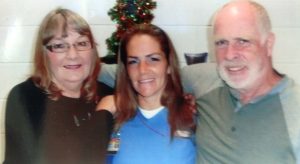By Kathleen Carlin
Editor’s note: Our Community Based News Room (CBNR) publishes the stories of people impacted by law and policy. The inaugural CBNR piece is from Kathleen Carlin, a Florida-based activist whose daughter is currently incarcerated at Lowell Correctional Institution in Ocala, Fla.
[dropcap]I [/dropcap]am 68 years old, and my life revolves around prison. My 43-year-old daughter, Sadie, is locked up at Lowell Correctional Institute in Ocala, Fla. She is one of the 2.3 million people who are incarcerated in the United States.I am one of the millions coping with the incarceration of a loved one.
I know things I wish I never knew about the inhumanity of the prison system.
When you have a daughter incarcerated, your life changes drastically, your faith in humanity diminishes, and your hope for a brighter future dims. Every day, you have to rise above what wants to drag you down—for your daughter’s sake, for your sake and for the sake of your family. You are doing time with your loved one, and the experience tests every part of your being: your mental strength, your emotional strength, and your spiritual strength. Incarceration permeates your dreams and life.

A Broken System
As Sadie went through the criminal justice system, I saw how broken it was. Sadie was arrested for attempted kidnapping and charges related to that in 2012. She was sentenced to 20 years in prison.
Before her arrest, Sadie was addicted to oxycodone and had a severe alcohol problem. Even with all of that, she always held a job, owned her own business and, at the time, was going to nursing school and working at St. Anthony’s Hospital. She attempted to stop using oxycodone, but in order to go through the withdrawals, she was offered crack cocaine. Within three months, she lost everything—her job, her housing and her daughter.
She went on a suicide mission. She started doing heroin and other drugs. One night, while buying a drink at a convenience store, she saw her drug dealer, whom she owed money. To elude the dealer, she got into the back seat of a woman’s car and told her to drive. Sadie told the woman her boyfriend was chasing her. Sadie removed a crack pipe pusher in her back pocket. The woman asked what she had, and Sadie was ashamed to tell her. When the lady realized that Sadie had no weapon, the driver grabbed Sadie’s hair, and they got into a scuffle. Sadie broke free and ran. The woman ran after her and called the police.
When the police found Sadie, she had slit her arms from wrist to elbow with a box cutter. The paramedics were called. She was arrested with many charges. The woman’s husband was a sheriff, and the woman had a slight scratch on her cheek and said Sadie cut her even though her crack pipe pusher had no DNA evidence and no sharp edges so they could not charge her with assault. The woman gave that account at Sadie’s trial.
Sadie had a public defender who did not defend her. He barely saw her and never prepared her for trial. He put her on the witness stand as the only witness. She had lost a lot of weight, was scared and did not do well on the stand.
The judge should have recused herself. Her husband represented Sadie in an earlier child custody case, and they parted on bad terms due to Sadie’s drinking. The judge had preconceived notions about Sadie from the beginning. At sentencing, the judge said that she had already made up her mind at trial to give Sadie 20 years. The judge had no empathy for Sadie at all. Sadie would not plead guilty to something she did not do nor intended to do. She thought that if she just explained everything that everything would be OK. She later tried to hang herself in jail.
At Sadie’s sentencing hearing, the public defender started acting like a public defender. A psychiatrist diagnosed Sadie with bipolar disorder (which she has had since she was a teenager) and suicidal ideation (which she has had all her life). Sadie had almost died from alcohol poisoning three times and had slit her wrists before. She committed herself when she was 18 because she didn’t know what was wrong with her. She had a drug and alcohol problem all through her teens and her life.
The public defender tried to reduce her sentence, but the judge was not having any of it. At the sentencing, she ranted, swore and said Sadie was a danger to society. Sadie had no history of serious offenses except for a felony DUI and child endangerment when she drove drunk with her daughter in the car and went off the side of the road (the judge’s husband was Sadie’s lawyer). Sadie’s offenses were due to alcohol abuse.
Her appeal and a post conviction relief motion were denied. We are now on a legal recourse for unlawful detention.
Now, Sadie is on a journey through the prison system, and I am seeing how broken that system is also.
Finding Meaning and Hope
This is the life in which my daughter and I have to somehow find meaning and hope. And we do.
Sadie was born in 1975. I married her father in 1976. We divorced about three years later, and he died from throat cancer about 15 years ago.
Sadie has five siblings across the United States. I was married five times and had six children with four different dads. Her siblings all love her, but they are not very active in her life except for her eldest sister, who lives in San Diego and has visited Sadie in prison.
Sadie grew up in a very dysfunctional environment. She was molested as a child. Her father took her and her sister from me when I had a nervous breakdown and Sadie was 5. They went to live with him and his wife even though they had not been involved much with Sadie or her sister.
Sadie and her sister came to live with me again when Sadie was 15. They had all kinds of issues. I had my own issues after being severely sexually abused as a child by my father and his friends and having a cruel and emotionally abusive mother. I was mothering from trauma. I am close with all of my children now (except for my youngest), but a lot of healing had to happen through the years to come to the place we are today.
Sadie and I have healed our relationship and consider ourselves soulmates. We love and support each other. When she has a hard time, I still sometimes get afraid that she will choose not to be here, but she says those days are over. She has worked hard on healing herself physically, mentally and spiritually. She takes no medication and practices yoga. Sadie is an amazing human being. When inmates get out and contact me, they always speak highly of her.
Searching for — and Creating — Support
Many women incarcerated with Sadie are indigent and have no family or outside support. For those with loved ones, their families are very poor.
Sadie is in the largest prison in the country with a population of about 3,000 women. They are robbed of their dignity, self-worth and hope. Their stories are painful and hard to hear. Sadie and I have endured guard abuse, non-nutritious food, medical and dental neglect and retaliation. She is a strong person and has learned to navigate the prison system to her benefit. She always tries to be upbeat and hopeful.
I don’t know if I could survive in that environment.
Sadie will be institutionalized when she gets out, and we will have to deal with that, among other things. Most of the women I talk to, even years later, have PTSD and coping issues.
I became an advocate by default because I loved my daughter and cared for all the women in that environment and wanted to help in some way.
I wrote hundreds of emails to the Department of Corrections about the conditions at Lowell.
I called (and still call) lawyers and family members on behalf of other inmates. Inadvertently, I gave them hope.
I researched prison rumors (of which there are many) and sent books.
I did fundraisers for packages, which they can get twice a year, so inmates can have toiletries, coffee and maybe a radio. The Florida Department of Corrections (FLDOC) supplies the bare minimum in toiletries to the inmates: a hotel-size bar of soap, toothbrush and a small tube of toothpaste. Deodorant, shampoo, lotion, bars of soap and other “luxury” items are dependent on donations from the public.
My family and I have donated puzzles, colored pencils, coloring books, basketballs, soccer balls, games, and so forth, as the FLDOC has no budget for recreational items.
I get thank you cards and letters. Sadie says, “Mom, everyone knows who you are, and you give them hope.”
The Difficult Responsibility and Obligation of Keeping On
Hope is a powerful thing. It can change a person. So I have an obligation and a duty to keep that hope alive.
The responsibility weighs on me. Sometimes, I just want to give up and go to Italy or the Bahamas and leave it all behind. Although things are beginning to change, I feel alone in my advocacy and get discouraged. But I can’t quit.
I could never abandon my daughter and leave her to cope alone in such a negative and soul-killing environment. Because of my own issues, I may have not been the best mother when I needed to be, but I can be the best mother now. Sadie will tell you that I am the best mom in the whole world, and it makes me cry.
Over the years during my daughter’s incarceration, the most surprising thing to me has been the public’s view of incarcerated and formerly incarcerated people. “They don’t deserve decent food,” people say. “They don’t deserve to be treated with respect and dignity. Make life for them as awful as possible.” Hearing those thoughts is when my faith in humanity started to wane.
What if the incarcerated person was your daughter or your loved one?
The incarcerated are someone’s daughter, mother, sister, aunt. They are our brothers and sisters. I have met many of them, and they are no different than you or me. They made mistakes—as you and I have. Most of their mistakes are due to drug addiction or mental illness. Most of them will get out and be someone’s neighbor. Possibly your neighbor.
We have such an opportunity for compassion, empathy and forgiveness. But instead of showing our humanity, we want to punish, judge and throw away the key.
Anyone is one mistake away from a similar situation.
Until it happens to you, you won’t really understand.
To learn more about Kathy’s work or make a donation to her organization that assists women at the Lowell Correctional Institution, click here.
Read how Sadie, Kathy’s daughter, has found peace in prison through yoga and how Jan Shelly, a retired attorney, is working with Kathy to fight for prison reform.
Do you have a story to share? Please contact us at the Community Based News Room here.




